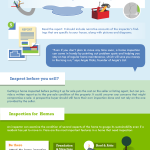If you’ve owned a home, then you already know what to expect on closing day. To sum up this monumental day, it involves a lot of paperwork, many signatures and a lot of excitement. There are so many moving parts on the day you close on your home that it can be hard to take it all in.
Typically, it takes an average of 45 days from your application submission to the time you close on your mortgage. There are many factors that dictate how long your home loan takes to close. These factors include the roles of your mortgage lending company and banker, your response time with documentation and communication from third-party vendors (such as the appraiser, title company and real estate agent).
So whether you’re a first time buyer or just need a refresher, here’s what closing day entails.
Before the Big Day
Prior to closing, you will have had a final discussion with your lender to review the loan and its terms to make sure you understand and agree to everything. Following this discussion, your lender will provide you with a Loan Estimate and a Closing Disclosure detailing your loan terms.
Your Loan Estimate consists of three pages and covers general information about your loan and the property details. The estimate breaks down your closing costs:
Origination charges (to cover lender expenses)
Third-party charges (taxes and homeowners insurance)
Estimated cash required at closing
The Closing Disclosure covers the same points as the Loan Estimate and adds information regarding your escrow account. Your escrow account holds funds to pay your taxes and insurance throughout the life of your loan.
Your lender is required to give you a minimum of three business days to review the Closing Disclosure before closing. If you request changes to your Closing Disclosure, a new one must be issued, and another three-day review period will begin. It’s critical to acknowledge receipt of the disclosure as soon as you get it so your closing won’t be delayed.
Realize that you have the power to help your closing day go smoothly. Be sure to review these documents carefully so you know what to expect at the closing table. It’s also extremely important that you make sure you have wiring instructions and or confirm how the monies for closing will be transferred. Most title companies now prefer that you wire the funds ahead of closing to save time.
Who Attends?
There is no set number of people who attend your closing. It really depends on your state, who is on the loan, the type of property you purchased, etc. Beyond you and your co-signers, possible attendees include the sellers or their representatives, your real estate agent, attorneys, the seller’s real estate agent, the closing agent (probably with the title company), a representative of the mortgage company and a notary.
Other Details
Your closing can take place almost anywhere! It typically takes place at the title company’s office, your mortgage lender’s office, a real estate attorney’s office or some other agreed-upon location. The closing is the time that you’ll sign your Closing Disclosure and provide evidence of your required homeowners insurance and any final inspections, if required.
If the funds weren’t wired beforehand, you’ll also bring a certified or cashier’s check to cover the down payment, closing costs, prepaid interest, taxes and home owners’ insurance. Your mortgage company then distributes the money and pays the closing agent.
Documents and Fees
There are many elements that go into your total closing costs, including the appraisal, credit report, processing fees, attorney fees, underwriting fees and purchase points. Closing costs will vary by geographic location.
It’s possible for the lender to roll your closing costs into the loan, which will make your loan and monthly payment a bit larger, but depending on your circumstances, it may or may not be something you need to do.
The Closing Disclosure is your promise to repay your loan; the mortgage or deed of trust provides a detailed legal description of the property you want to buy. The disclosure also confirms that you are pledging the property as collateral for repaying the loan.
Be sure you understand if or how your payments may change over time. With an adjustable-rate mortgage, your payments may increase over time, and it is important to understand when the payment can change and by how much. Even with a fixed-rate mortgage, your total monthly payment may change due to changes in your taxes or insurance.
Hello, Homeownership
After you make it through that, you’re officially a homeowner! You’ll walk away with copies of your documents and some shiny keys. Don’t forget to celebrate your big accomplishment!
So, now that you know how it works… let’ go find you a home!






